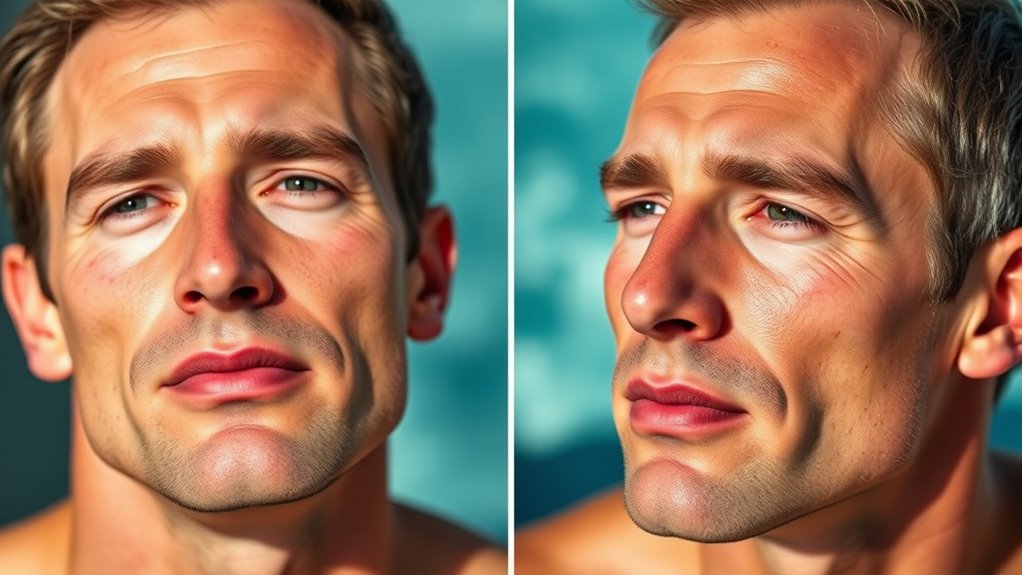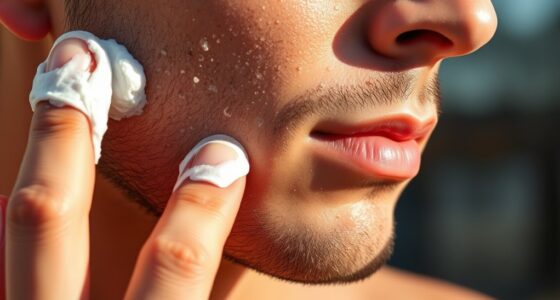Before sun exposure, apply a broad-spectrum SPF 30+ sunscreen generously to all exposed skin, including often-missed areas like behind your ears, neck, and jawline, and reapply every two hours. After sun exposure, wash your face with cool water, remove汗 and sunscreen residues, and use a calming, hydrating moisturizer to restore moisture and reduce redness. Stay committed to proper skincare, and you’ll learn more about protecting your skin effectively.
Key Takeaways
- Apply broad-spectrum SPF 30+ sunscreen generously to all exposed skin 15 minutes before sun exposure.
- Reapply sunscreen every 2 hours and after sweating or swimming for continuous protection.
- Wear protective clothing, hats, and sunglasses to shield sensitive areas like eyes and ears.
- After sun exposure, wash skin with cool water, then hydrate with soothing moisturizers containing hyaluronic acid or aloe vera.
- Stay hydrated and avoid harsh skincare products to support skin recovery and prevent damage.

Spending time in the sun can do wonders for your mood and appearance, but it also requires proper skincare to protect your skin from damage. Before heading outdoors, applying sunscreen properly is essential. Don’t just slap it on hastily; take the time to ensure even coverage. Use a broad-spectrum sunscreen with at least SPF 30, and apply it generously to all exposed skin—your face, neck, ears, and any other areas uncovered. Pay special attention to often-missed spots like the back of your neck and behind your ears. Reapply every two hours or immediately after sweating or swimming to maintain protection. Proper sunscreen application acts as your first line of defense against harmful UV rays, preventing premature aging, sunburn, and skin cancers.
Once you’ve protected your skin with sunscreen, your next step is to enjoy your time outdoors. But once you start sweating or after you’ve been in the sun for a while, your skin can become dehydrated and irritated. This is where post sun hydration becomes critical. When you come indoors or find shade, wash your face with cool water to remove sweat and sunscreen residues. Follow up with a hydrating moisturizer that contains ingredients like hyaluronic acid or glycerin. These help replenish moisture and soothe the skin, reducing redness and discomfort caused by sun exposure. Drinking plenty of water throughout the day is also essential, as staying hydrated from the inside supports your skin’s recovery and keeps it looking fresh and healthy.
After being in the sun, avoid harsh cleansers or alcohol-based products, which can strip your skin of its natural oils and worsen dehydration. Instead, opt for gentle, nourishing skincare that restores balance. If your skin feels particularly dry or irritated, consider applying a cooling aloe vera gel or a soothing after-sun lotion to calm inflammation. Remember, the goal is to hydrate, soothe, and protect your skin from further damage. Post sun hydration isn’t just about immediate comfort; it’s an important step in maintaining your skin’s health over time.
Frequently Asked Questions
How Can I Protect My Skin From UV Damage During Winter?
To protect your skin from UV damage in winter, you should use a broad-spectrum SPF daily, even indoors or on cloudy days. Keep your skin well-hydrated with winter hydration moisturizers to prevent dryness. Wear protective clothing and sunglasses when outdoors. Remember, indoor UV protection is essential if you spend a lot of time near windows. These steps help prevent UV damage and keep your skin healthy during winter.
Are There Specific Ingredients to Avoid Before Sun Exposure?
Think of your skin as a shielded fortress, but certain ingredients can weaken it. You should avoid ingredients to prevent, like retinoids, acids, and alcohols, before sun exposure. These can increase your sun sensitivity, making your skin more prone to damage. Opt for soothing, hydrating products instead. Staying vigilant about what’s in your skincare ensures your skin remains resilient and protected against harmful UV rays.
Can Skincare Products Cause Breakouts After Sun Exposure?
Skincare products can cause breakouts after sun exposure if they contain breakout triggers like heavy oils or irritating ingredients. Sun exposure can make your skin more sensitive, causing clogged pores and irritation. To avoid this, stick to lightweight, non-comedogenic products and adjust your skincare routines accordingly. Always cleanse thoroughly after sun exposure to remove sweat and sunscreen residue, helping prevent breakouts and keeping your skin clear.
What’s the Best Way to Treat Sunburned Skin Quickly?
Soothe, soften, and save your sunburned skin quickly by applying cooling, calming creams and hydrating masks. Start with a soothing cream containing aloe vera or chamomile to reduce redness and pain. Follow up with a hydrating mask to replenish lost moisture and promote healing. Keep your skin moisturized, avoid further sun exposure, and drink plenty of water to support recovery and minimize discomfort fast.
How Does Alcohol Consumption Affect Skin’s Sun Sensitivity?
Drinking alcohol increases your skin’s sun sensitivity because it causes dehydration, which weakens your skin’s barrier. When your skin is dehydrated, it’s more prone to sun damage and burns. Alcohol also dilates blood vessels, making your skin more vulnerable to UV rays. To protect your skin, limit alcohol intake, stay hydrated, and always apply sunscreen before sun exposure. This helps reduce your risk of sunburn and long-term damage.
Conclusion
By following these simple steps before and after sun exposure, you protect your skin from damage and keep it healthy. For example, imagine Jake spends weekends outdoors; applying sunscreen and moisturizing afterward keeps his skin clear and youthful. Don’t forget, consistent care makes a difference. So, next time you head outside, remember these tips—your skin will thank you for it, and you’ll enjoy a healthier, more refreshed look every day.









